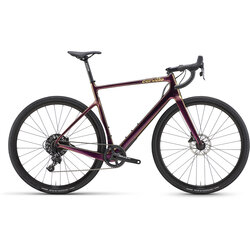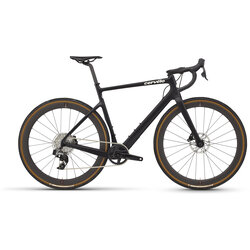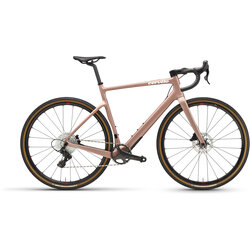Filter By:
Gravel
$3,100.00
HAUL ASS, NOT CARGO
A new breed of rider is emerging-one who loves the freedom and exploration that gravel culture was founded upon but who has a hunger to ride hard, to go all out, and to explore not just geography but personal limits. This frontier requires a new kind of gravel machine, one engineered not to roam the trails, but to race them.
For these athletes, we engineered Aspero for pure, unapologetic speed, ready to take down finish lines, KOMs, PRs, and FKTs. A bike built without limits, for the riders looking to test them. It's stiff, Classics-racing stiff, and performs like you'd want a road bike to perform off-road. We think that makes sense, and it's what we were trying to do when we were stuffing bigger tires into our existing frames and swapping in aftermarket forks to get a 40mm tire up front.
The flip-chip in the fork-we call it the Trail Mixer-keeps the trail measurement consistent whether you choose 700c or 650b tires. This maintains the bike's personality and handling characteristics when you switch from mid-fats to full-fat. There are as many different ways to do gravel as there are gravel bikes these days, but if you're toeing the start line, looking to stay with the lead group, and contend for the victory, Aspero is the bike to get you there.
$5,500.00
We engineered Áspero for pure, unapologetic speed, ready to take down finish lines, KOMs, PRs, and FKTs. A bike built without limits, for the riders looking to test them. It's stiff-Classics-racing stiff and performs like you'd want a road bike to perform off-road. We think that makes sense, and it's what we were trying to do when we were stuffing bigger tires into our existing frames and swapping in aftermarket forks to get a 40mm tire up front.
- Multiple Configurations
We designed Aspero with clearance for up to 700c x 40mm tires or 650b x 49mm tires. Of course, there are variables—rim width, tire casing, and tread depth—which will affect final clearance. We always recommend 4mm of clearance between the tire and frame.
**New Shimano road (not gravel) 12-speed front derailleurs reduce tire clearance in the rear of the frame to 700 x 38c or 650b x 45c.
- Two Position Adjustment
Trail—front-wheel response to rider input—is the most critical factor in high-velocity handling. Flipping the two-position "Trail Mixer" to compensate for the difference in circumference between a 650b and 700c tire maintains consistent handling by maintaining consistent trail figures.
- Balanced Handling
Stiffness and handling work together to ensure the bike tracks predictably and responds immediately to critical pedal and bracing inputs.
$6,000.00
Our engineers like to joke that, "if it looks fast, it probably is." But there's some truth to that, and Áspero-5 looks fast standing still. No cables in the wind, tube shapes from our aerodynamically-proven library, and a hint of a cut-out in the seat tube, all add up to a bike that proves the adage.
- Lightweight Speed
Some might say aero doesn't matter on a gravel bike, but if you've battled a headwind across an open prairie, the thirty-two grams of drag you'll save with the Áspero-5 come as a welcome respite. Most gravel racing is done without the benefit of a World Tour peloton—or World Tour tactics—and when it's your nose in the wind all day, it's nice to know your bike's shouldering a bit of the load.
- Two Position Adjustment
Trail—front-wheel response to rider input—is the most critical factor in high-velocity handling. Flipping the two-position "Trail Mixer" to compensate for the difference in circumference between a 650b and 700c tire maintains consistent handling by maintaining consistent trail figures.
- Multiple Configurations
We designed Aspero with clearance for up to 700c x 40mm tires or 650b x 49mm tires. Of course, there are variables—rim width, tire casing, and tread depth—which will affect final clearance. We (and the International Organization for Standardization, or ISO), always recommend 4mm of clearance between the tire and frame.
**New Shimano road (not gravel) 12-speed front derailleurs reduce tire clearance in the rear of the frame to 700 x 38c or 650b x 45c.
- SRAM Integrated Power
Red and Force builds include Quarq Zero power meters integrated into the crank. The integration of a power meter results in better stiffness, lighter weight, and improved accuracy over aftermarket solutions—and the DZero delivers power measurement accurate to +/- 1.5%, even in variable temperatures.
Page 1 of 1



